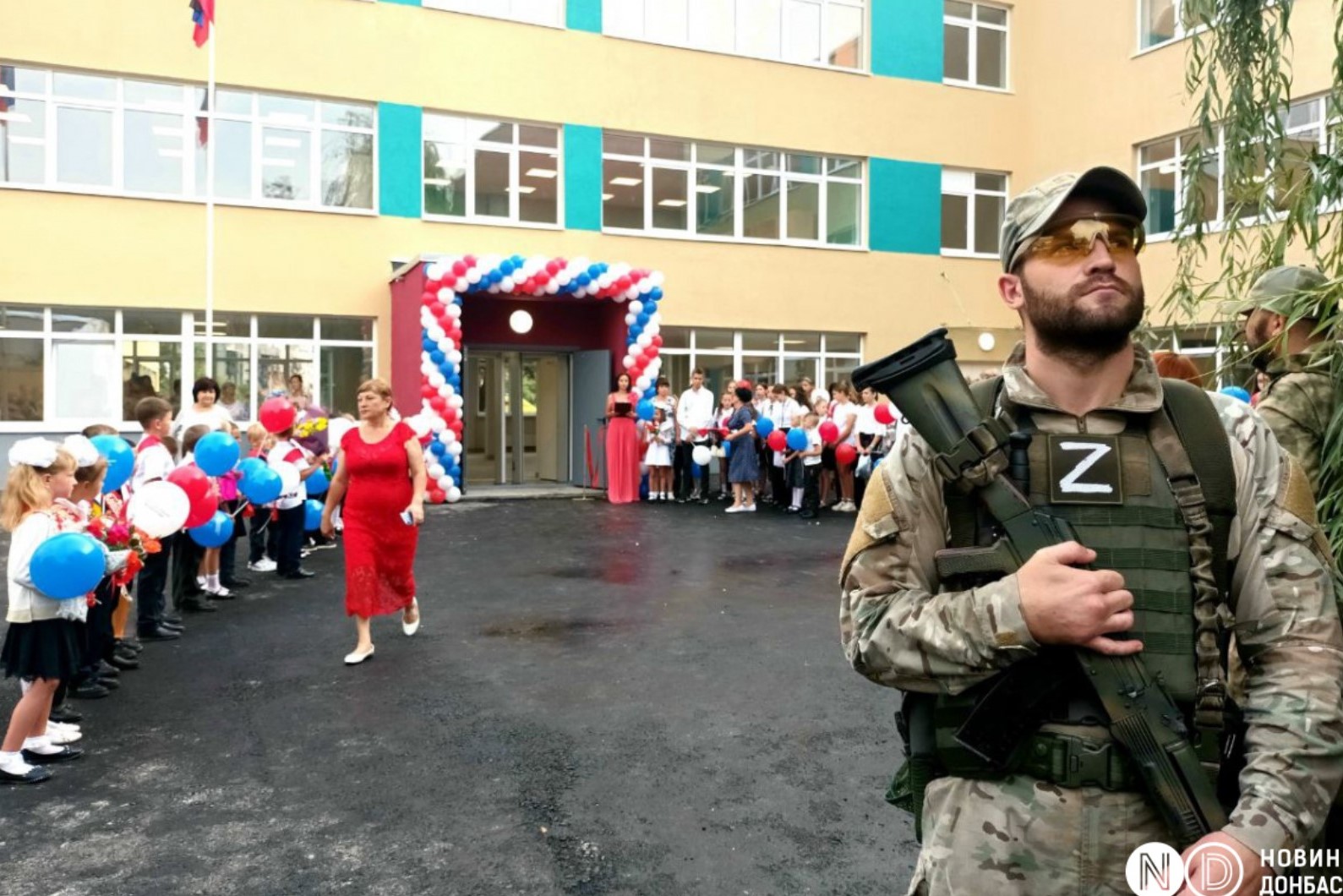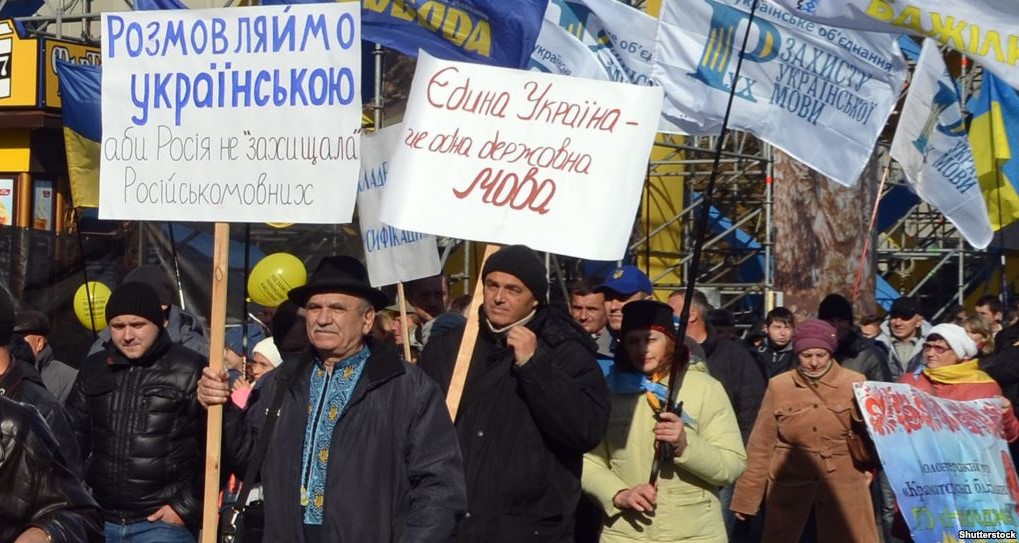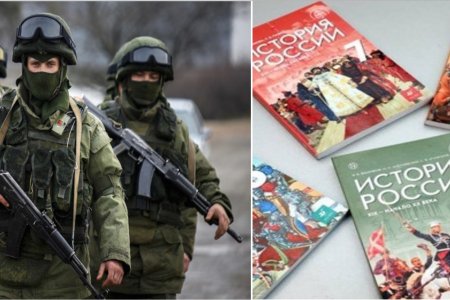
Since 2014, Russia has expended huge effort and expense on trying to destroy all aspects of Ukrainian identity, in particular the Ukrainian language, on any territory that came under its occupation. Those efforts have become more aggressive since its full-scale invasion of Ukraine, however they are meeting with strong resistance.
Viktor Kovalenko, Chief Editor of Berdiansk 24, recently told Radio Svoboda that “for the occupiers, there is no crime more terrible on occupied territory than somebody or something’s identification as being Ukrainian. They’re not particularly bothered by murders, rape, the abduction of people, just what bears some hallmarks of Ukrainian identity – language, shop signs. They get very wound up about Ukrainian number plates on cars. That is for them the most terrible crime…”. They react, he says, by imposing fines, or by taking people away and imprisoning them in basements where they are invariably subjected to torture.
Russia first demonstrated its priorities in Mariupol. Having relentlessly bombed and shelled the city, destroying up to 90% of its infrastructure, it sent communal workers to Russify the spelling of Mariupol at the entrance to the city. The invaders then proceeded to install huge screens, ensuring Russian propaganda about ‘brotherly nations’ and claiming it had ‘liberated’ Mariupol, while residents had nowhere to live, no heating, running water and, sometimes, nothing to eat.
The aggressor state is using the same tactics on all occupied territory. From Russifying the names of cities, streets, etc. or reinstating the Soviet names of the latter, they have now moved to eradicating any business names or advertising material in Ukrainian. According to Viktoria Halitsyna, Head of the Berdiansk Military Administration, in occupied Berdiansk businesses are being forced to change their signs and advertising from Ukrainian to Russian and to do so at their own expense. They are threatened with prosecution if they refuse.
Within a year of its invasion of Crimea, Russia had all but eliminated any school education in Ukrainian. Parents were, purportedly, asked if they wanted their children to have such education, but were put under huge pressure to say that they did not.
Viktor Kovalenko recalls that the invaders did something similar in occupied Berdiansk, with a ‘questionnaire’ issued on whether tuition in Ukrainian should continue in schools. A majority wanted it to continue, with this the last that was heard of the said questionnaire, with no further measures taken. He says that the Russians will go along with the development of any dialect, or language, and “for the picture, will support some kind of national minorities and the development of their culture and language, but, under no circumstances, Ukrainian. In fat, all of this is entirely “for the picture”. Russia made a lot of hype in the first years of its occupation of Crimea about three ‘official languages’ – Ukrainian, Crimean Tatar and Russian, with such ‘status’ for two of those languages only ever existing on paper..
In November 2023, Ukraine’s National Resistance Centre reported that the Russian occupiers were complaining “about the large number of people wanting to study in Ukrainian. Despite the pressure they are being placed under, Ukrainians on occupied territory were continuing to fight for their self-identification as Ukrainians. Although the report spoke of all temporarily occupied territory, it is likely that the resistance to pressure is seen primarily in those parts of Ukraine, seized after Russia’s full-scale invasion.
The occupiers had tried the same move as in occupied Crimea, with lessons of Ukrainian allowed only if asked for by the parents. This time, however, the parents had refused to succumb to threats and intimidation and had written the required statements. The Centre reported that this had led to a shortage of textbooks. As reported, in any area that falls under Russian occupation, there has been a purge on Ukrainian books in schools, with the invaders bringing in Russian books, especially those repeating its false narrative about recent history. They even produced their own Ukrainian textbooks, with these also aimed at pushing myths about ‘brotherly nationals’ and justifying Russia’s invasion and occupation. The number of such ‘textbooks’ brought to occupied territory proved inadequate for the demand. School heads, it was reported, had been instructed to put more pressure on parents. Such pressure, it should be stressed, would not just include verbal ‘encouragement’. Parents are likely to be told that their children’s grades will suffer if they insist of learning Ukrainian. In May 2024, the independent Crimean Discourse reported that children in occupied Crimea had had their marks lowered because they had refused to take part in appalling campaigns to have Ukrainian children sending ‘letters of gratitude’ to the Russians invading Ukraine.
It has been dangerous on any Ukrainian territory occupied by the Russians since 2014 to demonstrate pro-Ukrainian views. From the beginning of its full-scale invasion, Russia openly abducted and viciously tortured civilians, with those who had served in Ukraine’s Armed Forces, as well as those with a pronounced pro-Ukrainian position, among groups especially targeted. It is, therefore, telling that the National Resistance Centre has learned of cases in occupied Kherson oblast where Ukrainians refuse to change to Russia when speaking with the Russians who have come to occupied territory to earn money. The Ukrainian underground reports that doctors from Russia, working on the left bank of the Dnipro, i.e. the occupied part of Kherson oblast, complain that during compulsory medical examinations, local residents continue speaking Ukrainian. In referring to these results, Artem Petryk, a historian from Kherson, spoke to Radio Svoboda of this “problem” that the occupiers and collaborators had. Despite all of their propaganda, and their repression, “the population has continued to largely speak Ukrainian. The occupiers themselves, by the way, spoke about this, the collaborators acknowledged it. They said openly that the situation surprised them, especially in schools, after all very many local families prefer their children studying in Ukrainian. That surprised and scared them”.
While Ukrainian territory remains under occupation, he warns, Russification will intensify, with the Russians using ever harsher methods, ones that repeat the Stalinist methods in the Soviet Union.




